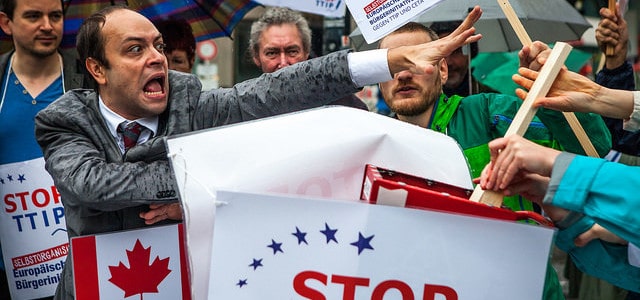Published
How to Prepare for the Next Anti-Free Trade Campaign?
By: Alice Poidevin
Subjects: European Union

The recent anti-free trade campaigns are one example of a changing political environment. By trying to block the CETA and TTIP negotiations, NGOs and citizens’ initiatives have now become part of the global debate on trade policy in Europe. They are also one reason why the European Union Institutions are facing more difficulties when promoting their trade policies.
The “STOP TTIP” campaign which called for the repeal of the negotiation mandate for TTIP and rejecting CETA has made it clear that 500 organizations are able to come together at a European level and cause serious headaches for EU policymakers. The protests that took place all across Europe, complemented by more than 3 million signatures gathered in 23 Member States, have shown that NGOs are able to deliver a common position on such a sensitive subject. What is more, the “STOP TTIP” campaign was registered, not without reticence from the Commission, as a European Citizens’ Initiative. This recognition is a success for NGOs as it enables them to suggest concrete legal changes and, therefore, influence EU policy-making, even though the Commission is not compelled to enact legal changes in response to the requests.
Some might still argue that the impact of such campaigns is negligible. After all, CETA came provisionally into effect in September 2017 and TTIP negotiations have collapsed primarily as a result of a political change in the US, not activists’ actions. Nevertheless, the Commission should not expect to get its future trade agreements passed easily. The campaigns clearly impacted the trade policy debate at a European level.
Since the anti-CETA and anti-TTIP campaigns, more campaigns have come along. One of them, the online game “Dodgy deals”, was created to “uncover the secrets of trade agreements like CETA and gives a taste of the trials and tribulations it has in stock for us”. It is an attractive communication tool: digital, easy to handle, and free of all conceited jargon usually surrounding political talks. It also highlights one of the most contested aspects of CETA, i.e. its provisions on regulatory cooperation. The game attracts by giving the player a taste of what could happen if she or he were in the shoes of an MEP trying to stop toxic chemicals from entering the European Union.
Such campaigns demonstrate that dialogue on FTA negotiations has become more difficult, namely because NGOs employ better communication strategies than the European Institutions, mostly in terms of how they are heard and understood easier. As an example, the European Commission is using mainly the DG trade website to communicate. Even though the content of the website is broad and well written, it is not accessible to a wider public as it is hidden away in the Commission’s website and impracticable for non-trade experts. NGOs are using appealing, modern communication tools to get the public involved in their crusade against free trade, while the political response often lacks these attributes.
In order to create and promote public support for its trade policy, the Commission tried to address some of the citizens’ concerns in its last trade policy strategy entitled “Trade for All”. It includes new rules on transparency of negotiations and makes it a goal to communicate to a wider audience. It also encourages more engagement with civil society and government representatives by addressing values such as social and environmental commitments. What is more, the European Commission, while negotiating with third countries, is now moving also towards an inclusive trade policy implementation, taking into account some anti-free trade campaigners’ demands.
However, there remains much more to do for the Commission if it wants to foster a fact-based debate that creates a better understanding of and ultimately support for its trade policy. Transparency is still mostly associated with anti-free trade campaigns rather than public institutions and governments. If European policymakers want trade policy to be supported by citizens, further actions are needed. To start with, getting outside the ‘EU Bubble’, engaging alongside with national government at both national and local level by delivering concrete examples of what trade benefits are, might be a way to tackle the negative attitudes and convince the unconvinced.
The civil society dialogues are one valuable initiative of the European Commission, which goes in the right direction. It brings together all kinds of organizations, NGOs, and businesses alike, to discuss trade policy at a European level. The way that civil society dialogues work by exchanging views is no longer efficient as anti-free trade campaigns increased their impact on the public debate. Further cooperation between EU institutions and the civil society on concrete aspects might be just what is needed to counter some of the harshest opposition. Participating members could engage in combating disinformation of a trade policy impact, as well as monitoring anti-free trade campaigns reactions on ongoing negotiations. Taking into account anti-free trade arguments, developing appropriate communication tools based on explaining the EU plan for future trade agreements could lead to better understanding, more ambitious and socially-aware trade deals.
As the EU is currently either negotiating or finalizing some of the major FTAs, designating an effective dialogue with citizens is an urgent undertaking if these trade deals are to be implemented smoothly. It should not only be the goal of EU institutions but also the civil society organizations in their areas of expertise and governments at national levels to be more engaged in the process of spreading trade policy awareness.
In this series of blog posts, we would like to present initiatives and practices aiming at promoting free trade within society.